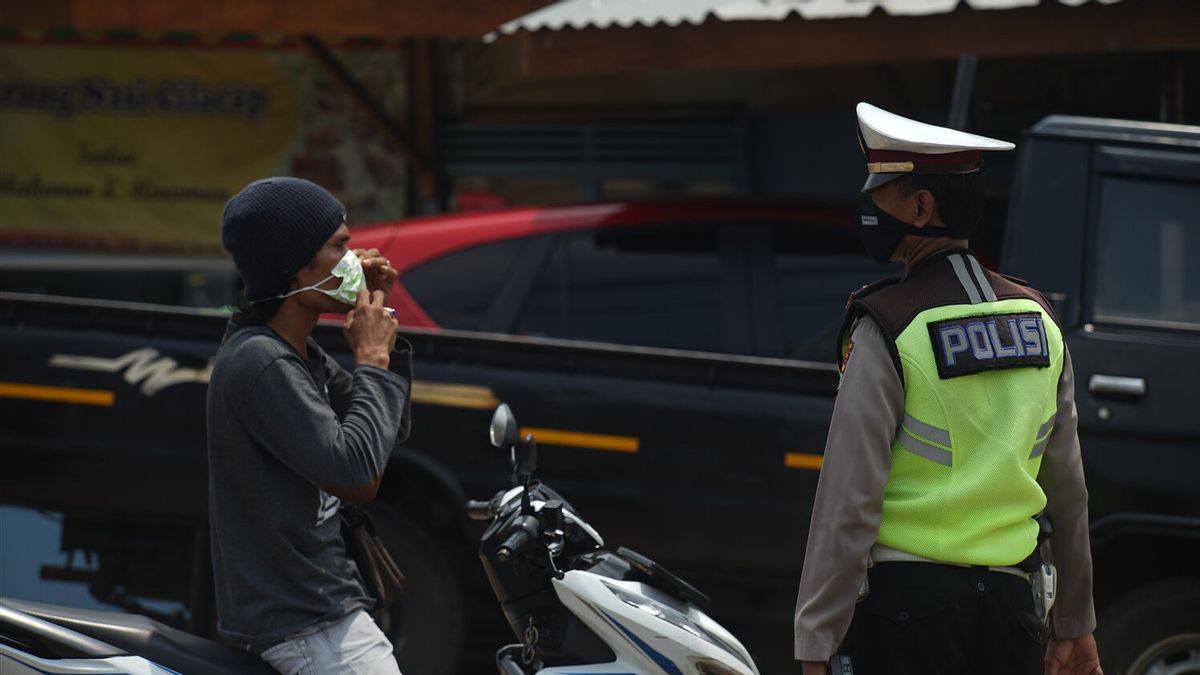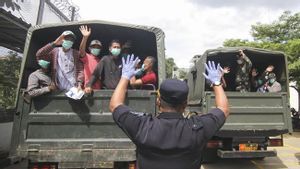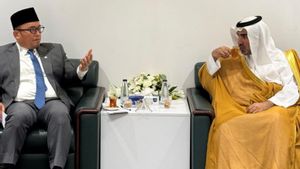JAKARTA - The blocking scheme during the Emergency Community Activity Restrictions (PPKM) has been running for several days. The police also noted the various obstacles or impacts that occurred and had prepared solutions.
One of the impacts is long traffic jams at various points of isolation. For example, congestion occurs on Jalan Blora which leads to Jalan Jenderal Sudirman, Central Jakarta. Then, in the Kalimalang area from Bekasi to Jakarta.
Traffic Director of Polda Metro Jaya Kombes Sambodo Purnomo Yogo said that traffic jams cannot be avoided during the implementation of the partition. Because people are still stubborn by continuing to move.
"Congestion is one that we cannot avoid because we enforce the rules. We have to check one by one vehicle whether it is a critical or essential sector," Sambodo told reporters on Monday, July 5.
Moreover, from the third day of PPKM it fell at the beginning of the week. So, people who live outside Jakarta try to come in to work.
However, they will not be allowed to enter if they are not included in the critical and essential sector. They also had to turn back to their respective homes.
"Monday is the third heart and the first day of Emergency PPKM on weekdays. Where people work and thousands of people from outside Jakarta are still trying to enter Jakarta. Even though he may not work in critical and essential sectors," said Sambodo.
On the other hand, congestion is also caused because many people are still working. The police also received information that many companies asked their employees to keep working. In fact, the company is not included in the essential and critical sectors.
"We also found that in the field, there were still several companies, the residents admitted that they were still being asked to cooperate with their companies, who knew it was non-essential," said Head of Public Relations of the Metro Jaya Police, Kombes Yusri Yunus.
In fact, referring to the policy for the Implementation of Emergency Community Activity Restrictions (PPKM), all companies operating in the non-essential sector are required to implement work from home or work form home (WFH) 100 percent.
Therefore, Yusri asked all people who were still asked to work even though it was not an essential and critical job to report. The police emphasized that the company could be dealt with strictly according to applicable regulations.
"Report it immediately, report it to the Task Force if you still find non-essentials, are forced by their owners or leaders to work, even though that is no longer allowed," said Yusri.
"This has resulted in a lot of buildup, the Gakkum team has already been conveyed by the Director of Crimes, they will continue to carry out patrols, will check directly, will monitor directly, find non-essential companies that still force their employees to work, we will take action, we will investigate. ," he added.
With various impacts and obstacles during the PPKM blockade scheme, the National Police also conducted an evaluation to find solutions.
The National Police Chief, General Listyo Sigit Prabowo, emphasized that the National Police would implement a new scheme at the isolation point during the Emergency PPKM. The new rules use signs and the use of work permits.
"So we convey to all ranks to make some kind of warning signs," said General Sigit.
"So we make signs starting at a distance of 1 kilometer, then 500 meters, and 200 meters whose contents are so that people who pass by then prepare the document requirements," he continued.
In its application, people who can submit a work permit can go through the blocking point. Meanwhile, for those who do not have forced to be turned back.
"If they can show that they have a certificate of employment in critical or essential sectors then they will be released. But if they can't show it then we have to turn it around because of the function of this PPKM.
While waiting for the issuance of work permits, continued General Sigit, his party only allowed certain categories of people to pass through the partition point. In addition to health workers, people who carry logistics and Gojek who deliver goods can pass through the blocking point.
"So we decided earlier that specifically for health workers or sectors related to hospital problems, we passed. Then those related to logistics, food, drinks, daily necessities, it passed, sir. Then Gojek also because they serve take away and maybe we give other things a chance to pass," he said.
The National Police Chief said the blocking scheme would start from the sub-district border and ahead of inter-district crossings.
"In the meantime, we apply it while waiting for a clear certificate. So that polemics in the field and crowds in the field can be anticipated," said General Sigit.
In addition, the National Police Chief also proposed the imposition of strict sanctions against companies that are in the essential sector but do not apply the rules for limiting the number of employees. The sanction can be in the form of closure.
"We also enforce the upstream sector's judicial operations. So if those who violate the provisions stipulated in the essential 50 percent rule, they will immediately take strong action, sir," said General Sigit
The imposition of closing sanctions, continued Sigit, aims to provide a deterrent effect. So, other companies obey the rules that have been made and don't try to play by the rules.
"Just closed it. So there is a deterrent effect for others," he said.
The English, Chinese, Japanese, Arabic, and French versions are automatically generated by the AI. So there may still be inaccuracies in translating, please always see Indonesian as our main language. (system supported by DigitalSiber.id)













